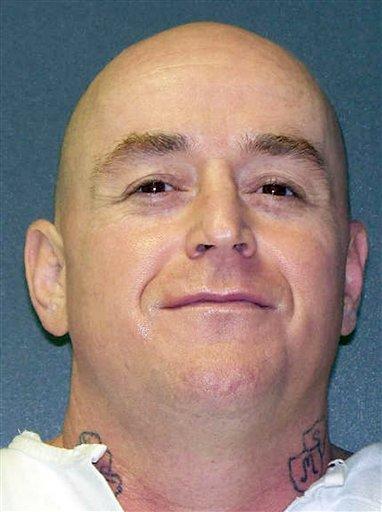
This undated handout photo provided by the Texas Department of Criminal Justice shows Mark Stroman. Stroman is scheduled to be executed Wednesday for one of two robbery-slayings. He also shot Rais Bhuiyan in the face in the incident claiming outrage by the events Sept. 11, 2001. (AP Photo/Texas Department of Criminal Justice)
“Arab slayer” turned peace seeker, Mark Stroman, was executed by the state of Texas on July 20th for shootings that killed two men and seriously injured a third in 2001.
His death sentence has garnered intense media coverage due to the aggressive campaign for life in prison without the possibility of parole instead of the death sentence.
Stroman’s main defender is none other than his only living victim, Rais Bhuiyan.
Stroman’s last words reflect Bhuiyan’s campaign message: “Hate is going on in this world and it has to stop. Hate causes a lifetime of pain.”
Following the 9/11 attacks, Mark Stroman went on a Dallas-area shooting spree with the intention of gunning down people of Middle Eastern descent “as a patriotic response to terrorism.”
The shootings took place in the Dallas area during September and October 2001.
Stroman, an alleged member of the Aryan Brotherhood, was free on bond for a gun possession arrest at the time of the shootings.
All three of Stroman’s hate crime victims were South Asian convenient store workers. Both Waqar Husan, a Pakistani immigrant, and Vasudev Patel, a naturalized U.S. citizen from India died. Bhuiyan was critically injured. He survived the shooting, although he is now blind in one eye and still has 35 shotgun pellets embedded in his face.
During his recovery, Bhuiyan, a devout Muslim, pledged to “dedicate his life to the poor and needy.”
Embodying this new resolve, Bhuiyan, as well as the families of Husan and Patel, took legal action to dispute the death penalty sentence.
Under the Texas Code of Criminal Procedures, article 56.02, crime victims have the right to seek mediate with their attacker. Bhuiyan claims that this right was violated. The plaintiffs claim that the prosecutor never consulted regarding the death penalty charge. Members of the jury also claim that they would have honored the families of the victims and not agreed on the death penalty charge.
Bhuiyan appealed to have the death penalty charge changed to life in prison on grounds of clemency. Gov. Rick Perry and other Texas officials ignored Bhuiyan’s campaign.
In response, Bhuiyan filed a lawsuit against the state, claiming his rights were violated. Unfortunately, all efforts failed to prevent the state’s decision to execute Stroman.
Director of the SMU Embrey Human Rights Program and former Amnesty International, Chair Rick Halperin, Ph.D., became involved in Bhuiyan’s campaign a year ago. A well-known human rights activist and advocate for abolishing the death penalty, Halperin is “not surprised but […] extremely disappointed in the callousness that the Texas Board of Pardons and Paroles and Gov. Perry have taken toward these specific pleas for mercy and compassion and life from both the survivor and the victims’ family members.”
“The governor of the state is an enemy of human rights, apparently no friend of crime victims, and [presents] a fraudulent picture of himself as a champion [of crime victims’ rights],” said Halperin.
Perry has been a strong advocate of crime victims’ rights in the past. In response to Bhuiyan’s claims of his violated rights, Perry’s legal team stated, “the ‘right’ [guaranteed to crime victims] is essentially symbolic . . .”
This is the eighth execution in the state of Texas this year. During his tenure as Governor of Texas, Perry has overseen 233 executions.
Bhuiyan, a native of Bangladesh, became a naturalized US citizen last year. This fall, he will attend SMU to study journalism and human rights.








